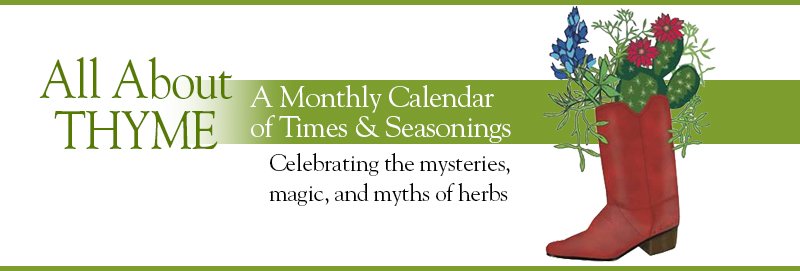Herb of the Year for 2022: Viola (violet, heartsease) named by the International Herb Association
Flower of the Month for October: Marigold
October is National Breast Cancer Awareness Month
October Feature: The Deadliest Herb
Week 1.
October 7: Ancient Romans celebrated Felicitas, the goddess of good luck, on this day.
October 8: A good Saturday to go for a walk through autumn woods and admire the colorful witch hazels.
Week 2.
October 11: Indigenous Peoples Day
October 14: National Dessert Day. Also, on this day in 1926, Winnie-the-Pooh was published. (Happy birthday, Pooh!)
Week 3. Friendship Week (Rosemary is the friendship herb).
October 18: Today is the birthday of herbalist Nicholas Culpeper, 1616-1654.
October 22: National Nut Day (No, not that kind—think pecans, walnuts, almonds).
Week 4.
October 24: On this day in 1788, Sarah Hale was born.
October 25: World Pasta Day
October 30: National Candy Corn Day
Week 5. Witching Week (We made this one up, but it fits, don’t you think?)
October 31: Halloween!
We found a man in a canoe going from Santa Maria to Fernandia. He had with him some dried leaves which are in high value among them, for a quantity of it was brought to me at San Salvador.—Christopher Columbus, Journal, October 15, 1492
They were looking for China–and for spices, tea, and silk. Instead, they found tobacco. Rodrigo de Jerez , one of Columbus’ crew. gets the credit for becoming the first European who was brave enough to light up. Back home in Spain, however, his neighbors were terrified by the smoke coming out of his mouth and nose. The local Inquisitor prophetically ruled that “only the Devil could give a man the power to exhale smoke” and sentenced Rodrigo to jail for seven years, which would give him plenty of time to kick his “sinful and infernal habit.” But by the time he got out, everybody in Spain was reaching for a light. Tobacco was on its way to becoming one of the most prized herbs in history–and the most deadly.
The dried leaves of tobacco were valued for the feeling of well-being that smoking imparted. But it was the herb’s medicinal properties that were most often touted. It was claimed to be especially effective in the treatment of headaches, toothache, worms, bad breath, lockjaw, and cancer. In 1603 in England, the physicians wrote an urgent letter to King James I, complaining that the drug was being used without a prescription; the king promptly levied a large import duty on tobacco imports and the price shot up. That didn’t stop people from lighting up, of course. A few years later, Sir Frances Bacon wrote that more people than ever were smoking, and that it was next to impossible to quit. And in the American colonies, where a would-be husband was required to fork over 120 pounds of tobacco for his bride’s ship passage, tobacco rapidly became the monetary standard. It helped to finance the American revolution, subsidized the practice of slavery, and contributed enormously to the new country’s growing wealth.
It wasn’t until the 1950s, some 500 years after Rodrigo took that first puff, that tobacco’s significant health risks were recognized. In 1906, the new Food and Drug Administration put nicotine on the list of drugs; it was removed after intense lobbying by the tobacco industry. The first tobacco lawsuit, filed by a man who lost his larynx to cancer, was won in 1962; the first second-hand smoke suit was won in 1976. In 1995, the FDA finally declared nicotine a drug. But cigarette smoking still causes one in every five deaths each year. Tobacco is one of the herbs that is not good for us.
Tobaco is a remedy for the Tooth-ache, if the Teeth and Gumbs be rubbed with a linnen Cloth dipp’t in the juice, and afterward a round ball of the leaves laid unto the place.—John Gerard, Herbal, 1597
More Reading: Tobacco: A Cultural History of How an Exotic Plant Seduced Civilization, by Iain Gately
Celebrate Indigenous Peoples Day by exploring Native American cookery. Start with these ideas, then focus on foods that are native to your own region. (And yes, you really can make acorn flour. a really interesting process.)
What does witch hazel have to do with witches? Exactly nothing. The Mohican Indians used forked witch hazel sticks to locate underground water, and colonists eagerly copied them. But while “witching” for water (or precious metals) may sound spooky, the name “witch hazel” has nothing to do with the supernatural. In England, small trees (ash, elm, hazel) were cut, or coppiced, to encourage the growth of pliant shoots, or wyches, for bows and woven fencing. Witch hazel shrubs reminded colonists of the coppiced trees back home. Learn more about this valuable astringent herb in the October 20 entry in The China Bayles’ Book of Days.
Create your own special celebration of the Roman goddess Felicitas by making a list of the good fortune you have experienced in the past month. If you’re not feeling fortunate, here are a few herbs that have traditionally been considered lucky:
• For Europeans, allspice promoted luck, health, and happiness.
• Romans washed their hands in chamomile before they put down their dinari.
• Chinese strung nutmegs, star anise, and bits of sandalwood in a lucky necklace.
• Swedes planted hen and chicks (Sempervivum) on the roof to bring good fortune and ward off bolts from the blue.
• Still down on your luck? Try thyme, rosemary, spearmint, honeysuckle–and cross your fingers.
You may never have heard of Sarah Hale, but you can probably recite her poem, “Mary Had a Little Lamb.” Now, through the magic of the internet, you can turn the virtual pages of her famous cookbook and see what American women were cooking two centuries ago. Here are Sarah’s instructions for making herb blends, plus “Rules to be Observed with Pickles.” Flip a few pages and see what else you can find. If y ou run out of vinegar, for instance, learn how to make your own (page 216).
Looking for some Halloween reading? Witches’ Bane, the second mystery in the China Bayles series, is full of spooks and devilish doings.
Here in Texas, it’s time for pecan harvest. So by National Nut Day, we are fully prepared to get out the slow cooker and start cookin’ up some Tex-Mex Spiced Pecans—the ones we love to snack on and give away at the holidays. (You might also be interested in some of the other snack recipes on that page.)
For National Pasta Day, let’s not dish out the same old spaghetti. Treat yourself to an unusual pasta-and-pea salad, made with a mint-arugula pesto. Delicious, different, and quick!
Find out what Susan is up to during these autumn days by visiting her blog, Lifescapes. There’s always something interesting going on in the Texas Hill Country. On her “other” blog, BookScapes, she posts reviews of books she’s read and notes on the fast-changing world of books.






